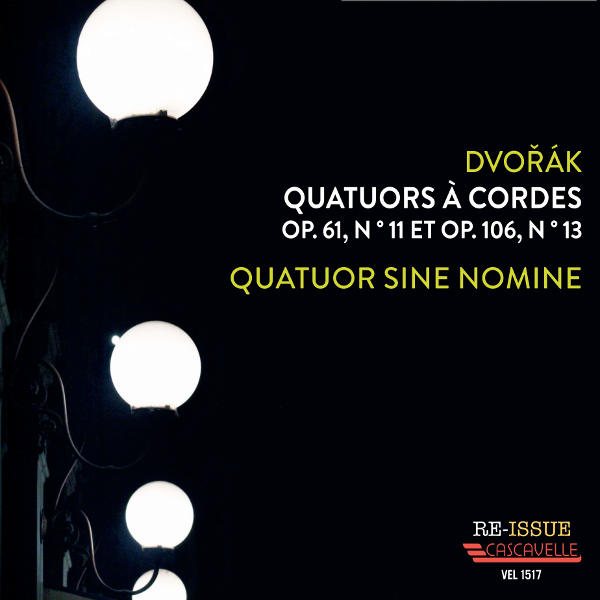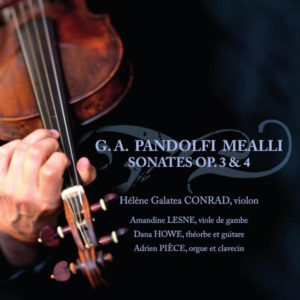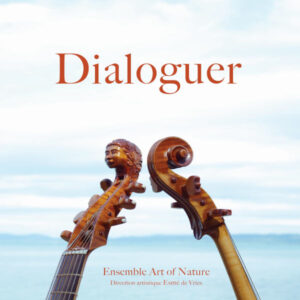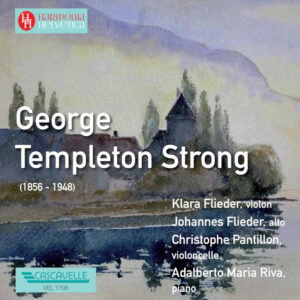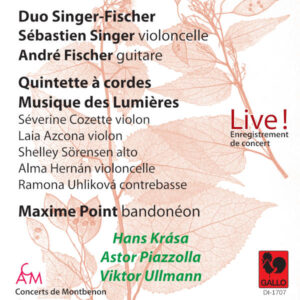Extraits / Excerpts
ANTONIN DVORAK : STRING QUARTET NO. 11 IN C MAJOR, OP. 61 – STRING QUARTET NO. 13 IN G MAJOR, OP. 106
Antonín DVORAK : String Quartet No. 11 in C Major, Op. 61, B. 121 – String Quartet No. 13 in G Major, Op. 106, B. 192
Quatuor Sine Nomine : Patrick Genet, François Gottraux, Violins – Nicolas Pache, Viola – Marc Jaermann, Cello.
Chamber music is both an important and constant element in the works of Antonin Dvořák. With his only musical training being that provided him by the schoolmaster of the village of Zlonice, it was in Dvořák’s String Quintet in A minor, Op. 1, followed soon thereafter by his String Quartet in A major, that this onetime butcher’s apprentice embarked on his career as a composer. The first of these works was written in 1861, when Dvořák was just twenty years of age ; the latter in 1862. Dvořák’s chamber music was to evolve along the same lines as his
symphonic works : first, a period in which he was in search of his own personal style ; followed by a period of Slavic influence, followed, in turn, by a period of American influence. And in his later works, Dvořák’s music is informed by deep feelings of national pride.
The list of Dvořák’s chamber music is quite long : fourteen string quartets (including the unpublished works of his youth), one string sextet, two piano quartets, four piano trios, as well as several sonatas for violin and cello. The richness of Dvořák’s chamber music works rivals that of Schumann and Brahms. While such works as the New World symphony, the Dumky string trio and the American string quartet have certainly contributed to making Dvořák’s name widely known, they have also tended to mask a considerable part of the musical output
of the great Czech composer. This recording is intended to serve as irrefutable evidence of Dvořák’s unaffected and moving genius. Commissioned for a violinist at the Imperial Court of Vienna, the String Quartet in C major, Op. 61 was composed by Dvořák in 1881. Pressed for time, he was to rework various musical themes in this piece which he had already committed to paper several months earlier. This anecdote is significant, for, far from detracting from our appreciation of the work, it illustrates, rather, the extraordinary technical mastery of the composer.
Few echoes of traditional folk tunes are heard here ; insofar as its form and overall structure are concerned, they are influenced to a certain extent by the works of Beethoven. The first movement is deeply emotional elegy ; which is followed by a sprightly, highly rhythmical scherzo. The final movement is clearly the most fully developed of the three, consisting of a brief slow introduction, serving as the point of departure for a whirling Skocna (Reel), interrupted, in turn, by a theme permeated with the Slavic melancholy so dear to the composer.
Dvořák’s String Quartet in G major, Op. 106 (like his String Quartet in A flat, Op. 105) represents both the apogee and end of his chamber music output. Immediately upon returning to his native land, following three relatively happy years in the New World, Dvořák was to compose two string quartets (whose numbering is confusing insofar as opus 106 was actually written prior to opus 105). Using the form of the string quartet as the tool to express his joy, Dvořák incorporates into the scherzo and final movements memories of his stay in America – memories engulfed, however, in a strongly Slavic atmosphere. As Otakar Sourek, Dvořák’s biographer, points out : « The opening movements of the String Quartet in G major constitute its central core. The first movement, genuine, joyous and smiling, is remarkable for the originality of its musical ideas, as well as its boldness and grandeur. The second adagio movement possesses a hymn-like fervor, intoxicating beauty, rare depth and a solid structure ».
This string quartet wonderfully expresses the enthusiasm of the composer, delighted to set foot on his native soil once again after three years’ « exile » in America. Dvořák was 54 years of age upon his return. And while he had yet another nine years to live, this song of joy marks the end of his output of a musical genre for which he had produced so many fine works. From this point on, Dvořák was to devote his talents to the composition of program music and operatic works – a lifelong dream.
François Hudry
- Categories
- Composers
- Interprets
- Booklet
